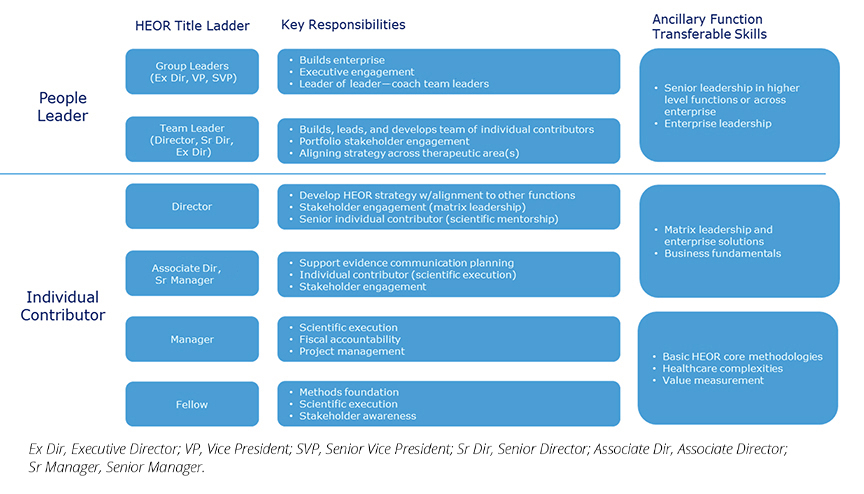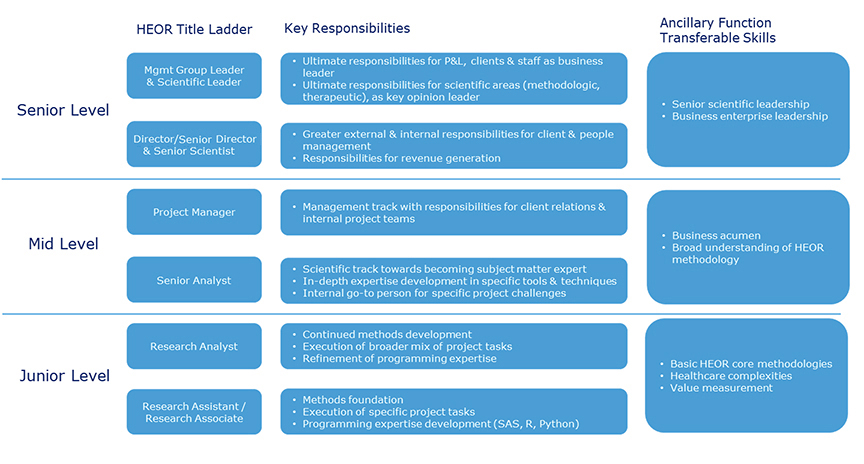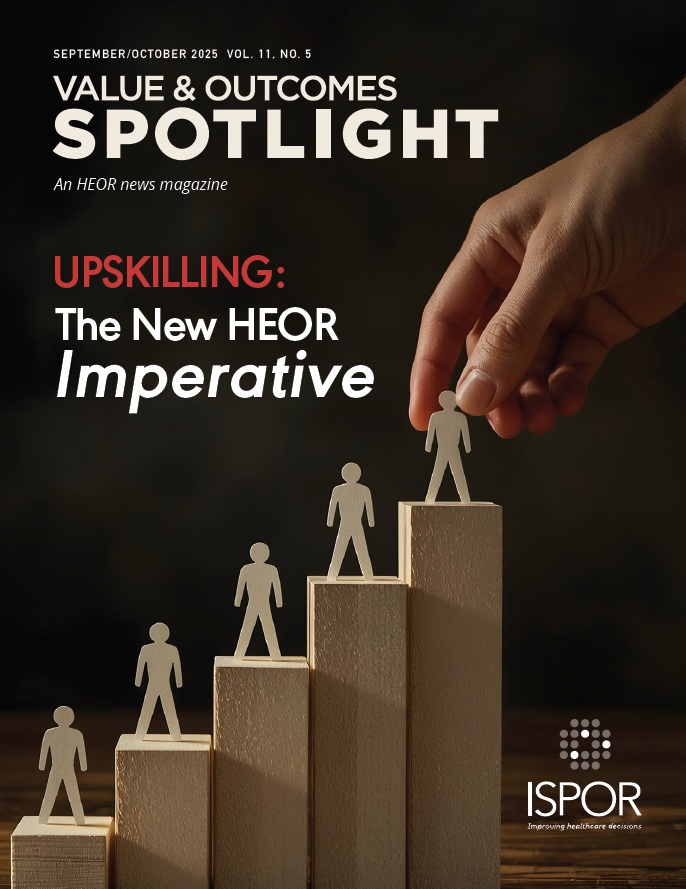Climbing the HEOR Career Ladder: Strategies for Success in an Era of Change
David Thompson, PhD, Rubidoux Research LLC, Manchester-by-the-Sea, MA, USA; Christopher Blanchette, PhD, MBA, Clinical, Medical and Regulatory Affairs, Princeton, NJ, USA; Stephanie Earnshaw, PhD, Access Strategy Consulting, Pittsboro, NC, USA
Introduction
Since its inception nearly 3 decades ago, ISPOR has been instrumental in furthering its members’ training and development in the tools and techniques of health economics and outcomes research (HEOR). ISPOR short courses, educational webinars, and online resources predominantly focus on HEOR methodology, with content ranging from beginner-level fundamentals to advanced topics on the frontiers of innovation. ISPOR’s Health Economics and Outcomes Research Competencies Framework—developed to structure professional development needs and identify gaps in current training opportunities—also has a strong methodologic focus.
Yet, as the field of HEOR has matured and become more established as a profession, the prerequisites for career advancement have evolved beyond just demonstrating increasing levels of methodologic expertise. In biopharma, HEOR teams are now less siloed and more integrated with other functions, such as market access and medical affairs, as value evidence has become table stakes to a product’s commercial success. Similarly, in the larger consultancies and contract research organizations (CROs), HEOR is less often positioned as a “boutique” standalone and more frequently integrated into bundled service offerings that include clinical and real-world evidence generation and/or commercialization support.
Artificial intelligence (AI) presents yet another disruptor to traditional HEOR methodologists’ career paths, as it transforms how data are analyzed, results interpreted, and content generated across all disciplines. At present, AI is a key enabler to “human-in-the-loop” processes for prototypical HEOR projects like systematic literature reviews and analyses of real-world data sources, which confers a competitive advantage to those with fluency in these tools and techniques. But some see the foreboding specter of full-blown automation of these activities in the future.
These trends significantly impact career advancement strategies in HEOR. Professionals must now transcend pure methodology, cultivating broader strategic thinking, effective cross-functional communication, and deeper understanding of HEOR’s commercial relevance. These uniquely human capabilities become more valuable as AI assumes responsibility for routine research processes. In this article, we build on issues and themes we discussed in a forum session earlier this year at ISPOR 2025 in Montreal. While our focus is on life sciences companies and CROs/HEOR consultancies, much of the discussion applies to careers in government and academia as well, which are similarly experiencing significant disruption and realignment.
The prerequisites for career advancement have evolved beyond just demonstrating increasing levels of methodologic expertise.
Career advancement in life sciences organizations
In biopharma, the value of core training in HEOR is widely accepted as critical to all functional areas. With health economists and outcomes researchers increasingly integrated with other functions, there are opportunities for those with HEOR training to apply these fundamental skills to other critical areas of the business that we typically don’t receive training in. Using HEOR training as a fundamental base, we can enhance our skills to include project management, financial acuity, enterprise mindset, and marketing, to name a few, thereby unlocking a rewarding career opportunity across the industry.
As illustrated in the career ladder in Figure 1, the first stage at which one may take these skills to other functional areas is immediately after graduate or fellowship training in the fundamentals of HEOR when there is an expectation of methodologic competency. The second stage is after a few years of an entry-level HEOR role where one has gained more widespread experience in the application of these methods and where one has broadened their knowledge base as individuals working in cross-functional teams to solve business challenges that touch across multiple functions. The final stage is when one has leadership responsibilities and has moved away from applying the methods. In these roles, HEOR fundamentals can enhance the broader higher-level functions and be utilized in other functions across the organization. It is also important to note that experience in the ancillary functions can be valuable to bring back to the core HEOR studies.
Figure 1. HEOR career progression in life sciences organizations

Continued professional development as the environment changes is critical to one’s success in industry. As AI and more data science technologies continue to advance, HEOR professionals will need to learn how to harness these technologies to deliver studies, models, and insights more efficiently to meet the needs of the business. This should not be seen as a threat but rather a tool to enable greater impact of our work. AI may be thought of as similar to the invention and increased use of computer hardware/software back in the 1970s, 1980s, and 1990s. One would hardly argue that the advances in computer processing and statistical software have inhibited our advancement in HEOR, but rather they have made us more efficient and productive. Think about it. It would be hard to do much of our work with an abacus. Similarly, embracing AI assistance with coding, writing, model development, etc., will allow us to deliver faster and more targeted results that enable us to understand and interpret for stakeholders, customers, and executives.
Career advancement in contract research organizations and consulting firms
For those in the consulting world, supporting the pharmaceutical industry has been the primary focus for revenue generation. Students from highly respected health system and pharmacy administration, pharmaceutical systems and policy, and other highly mathematical/statistical programs would step onto the career ladder at the junior level, as shown in Figure 2. Often, team members within these organizations grow their careers by becoming experts in a very specific scientific method (eg, evidence synthesis, comparative effectiveness, economic modeling, analysis of real-world data). Within these organizations, team members would move up in their careers by transitioning from the “doer” role to the “project manager” role. In some situations, team members can choose a more technical path to be an expert in a very specific method, on a track that will develop their subject matter expertise towards ultimately becoming a key opinion leader in their chosen specialization.
Figure 2. HEOR career progression in CROs and consultancies

However, as the field has evolved, knowing the science has not been enough. There is a critical need to embed HEOR earlier in the product development life cycle as well as in the middle and towards the end of the life cycle. Having the full product life-cycle picture enables individuals to answer the “so what”, “how do we align the outcomes with other work and with clinical/market access messaging”, and “how to successfully communicate the work” questions. Being strategic and understanding these aspects are of the utmost importance. These are service offerings that are more often best provided by the larger consultancies and CROs or by individuals who have the full product life-cycle picture.
In today’s financially constrained market, embracing the use of AI and understanding the application of HEOR to health interventions other than pharmaceuticals will also be critical. Specifically, performing HEOR more broadly and efficiently will be the key to success. AI will enable consultancies to create efficiencies, but AI may not be as capable on the strategy front. As the importance of HEOR grows, an expanded and strategic mindset is becoming essential to providing guidance around what we do, how we apply HEOR, and how we communicate our findings.
Professionals must now transcend pure methodology, cultivating broader strategic thinking, effective cross-functional communication, and deeper understanding of HEOR’s commercial relevance.
Conclusions and implications
The HEOR profession stands at a pivotal juncture where methodologic expertise is necessary but not sufficient for career advancement. HEOR professionals need to expand not just their skillset, but also their mindset—to move beyond technical proficiency to encompass business acumen, cross-functional collaboration, and strategic thinking.
Within pharma, the integration of HEOR teams with market access, medical affairs, and other commercial functions has fundamentally altered the career path, requiring professionals to demonstrate not only what the research shows, but how it aligns with broader business objectives and product life-cycle strategies. The bundling of HEOR with broader clinical and commercialization services within the larger CROs and consultancies requires understanding how HEOR contributes to the overall client picture.
For HEOR professionals navigating this evolving landscape, the implications are clear: career success requires intentional skill diversification and strategic thinking.
The emergence of AI as both an enabler and potential disruptor presents a significant challenge demanding proactive adaptation instead of defensive resistance. While AI increasingly automates routine analytical tasks—from systematic literature reviews to real-world data analysis—it simultaneously creates opportunities for HEOR professionals to focus on higher-value activities such as strategic interpretation, stakeholder communication, and business integration. Those who successfully harness AI as a productivity tool while continuing to develop their distinctly human capabilities in strategic thinking and cross-functional leadership will find themselves better positioned for career advancement than those who remain confined to purely methodologic roles.
For HEOR professionals navigating this evolving landscape, the implications are clear: career success requires intentional skill diversification and strategic thinking. Whether in biopharma, consulting, or other sectors, professionals must actively seek opportunities to broaden their experience beyond core HEOR methodology, developing competencies in commercialization, financial understanding, and strategic communication. ISPOR is already evolving its training and development offerings to reflect these changing requirements, ensuring that the next generation of HEOR professionals is equipped not only with methodologic rigor but also with the business savvy and flexibility necessary to thrive in an increasingly integrated and AI-augmented healthcare landscape.

